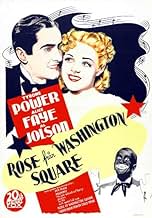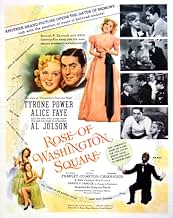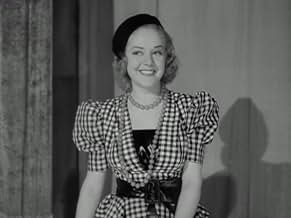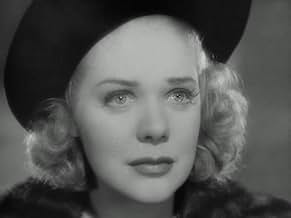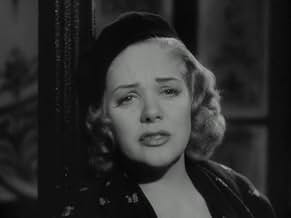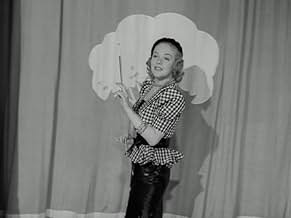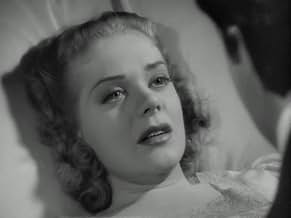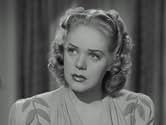IMDb RATING
6.7/10
684
YOUR RATING
A singer becomes a star in the Ziegfeld Follies, but her marriage to a con man has a bad effect on her career.A singer becomes a star in the Ziegfeld Follies, but her marriage to a con man has a bad effect on her career.A singer becomes a star in the Ziegfeld Follies, but her marriage to a con man has a bad effect on her career.
- Director
- Writers
- Stars
- Awards
- 2 wins total
Paul E. Burns
- Chump
- (as Paul Burns)
Horace McMahon
- Irving
- (as Horace MacMahon)
- Director
- Writers
- All cast & crew
- Production, box office & more at IMDbPro
Featured reviews
This is an excellent movie musical from the 20th Fox studio, which made excellent movie musicals. Fox made all those great musicals with John Payne and Alice Faye, until she got supplanted by Betty Grable. It's all here - storyline, music, production values and a Who's-Who cast of memorable character actors from the Golden Age of Hollywood.
"Rose" is actually a revue with only one or two songs written for the movie; "I Never Knew Heaven Could Speak" is one and is the best song in the picture. The rest are songs from pre and post WW1 and are old standards - there are 20 songs in all. Then there is the Cigarette Dance which contains some trick photography and is very clever indeed.
It stars Tyrone Power and Alice Faye who handle acting chores, but the singing duties belong to Al Jolson, who at one time was considered the best entertainer of the 20th century on either coast. He comes alive when he sings his signature numbers but has a very limited acting range. This picture is seldom seen today because, for reasons rooted in the early part of the last century, Jolson sang in blackface. Apparently this worked for him but the film is no longer in the good graces of the PC crowd and those intimidated by them. The plot is based (loosely) on Fanny Brice and her husband/problem child Nicky Arnstein. As we know too well, Hollywood feels fiction is stranger than truth and punches up many stories that were good to begin with. Plus, they were true, and what fun is that.
Do yourself a favor; if you can find this picture watch it and see how Hollywood used to do it in the good old days. As I stated in the summary, that's entertainment in the purest sense of the term. I gave it a well-deserved rating of 8.
"Rose" is actually a revue with only one or two songs written for the movie; "I Never Knew Heaven Could Speak" is one and is the best song in the picture. The rest are songs from pre and post WW1 and are old standards - there are 20 songs in all. Then there is the Cigarette Dance which contains some trick photography and is very clever indeed.
It stars Tyrone Power and Alice Faye who handle acting chores, but the singing duties belong to Al Jolson, who at one time was considered the best entertainer of the 20th century on either coast. He comes alive when he sings his signature numbers but has a very limited acting range. This picture is seldom seen today because, for reasons rooted in the early part of the last century, Jolson sang in blackface. Apparently this worked for him but the film is no longer in the good graces of the PC crowd and those intimidated by them. The plot is based (loosely) on Fanny Brice and her husband/problem child Nicky Arnstein. As we know too well, Hollywood feels fiction is stranger than truth and punches up many stories that were good to begin with. Plus, they were true, and what fun is that.
Do yourself a favor; if you can find this picture watch it and see how Hollywood used to do it in the good old days. As I stated in the summary, that's entertainment in the purest sense of the term. I gave it a well-deserved rating of 8.
Entertainment careers, romance, and petty crime mix together to create a reasonably good film, based on the real life story of Ziegfeld star Fanny Brice and her attraction to gambler Nicky Arnstein. The script changes the names, and the two leads become Rose (Alice Faye) and Bart (Tyrone Power). "Rose Of Washington Square" is a thin story connected by numerous musical numbers.
The film has the look and feel of a long-ago era, specifically Vaudeville, with its eclectic mix of self-contained acts: singing, dancing, magic, and comedy. One lengthy segment features Rose singing in Washington Square, but interrupted by an unrelated act called "Igor and Tanya", an acrobatic performance not connected to anything else in the film. And then there's the stage performance wherein Rose and various dancers perform a dance that includes a magic act. As the dancing proceeds, each person brings forth a lit cigarette out of thin air, smokes it, then fetches another cigarette from out of nowhere.
This tribute to Vaudeville goes into overdrive with the appearance of entertainer Al Jolson, as character Ted Cotter. This character has little or nothing to do with Fanny Brice. I think the reason he's in the script is that he represents Brice's historical era. Jolson's inclusion ignites the plot, generating real pizazz into an otherwise lazy, dreary story. All bug-eyed and in black-face, and wearing white gloves, Jolson electrifies at the plush Winter Garden Theater, with his standard songs: "Rock-A-Bye Your Baby", "My Mammy", and "California, Here I Come".
Casting is mixed. Tyrone Power is surprisingly good. And I enjoyed William Frawley as a talent agent. But glamorous Alice Faye is not convincing as a stand-in for Brice. Faye does sing quite well, but I didn't care for any of her songs, with the exception of "My Man", Brice's signature number.
Costumes, hairdos, and prod design all seem to reflect well the early twentieth century era. B&W cinematography, sound effects, and editing are all competent, and pleasantly unobtrusive.
Without Jolson, the film would be average at best. But Jolson alone ups the entertainment value several notches, and that Vaudeville atmosphere is wonderfully nostalgic.
The film has the look and feel of a long-ago era, specifically Vaudeville, with its eclectic mix of self-contained acts: singing, dancing, magic, and comedy. One lengthy segment features Rose singing in Washington Square, but interrupted by an unrelated act called "Igor and Tanya", an acrobatic performance not connected to anything else in the film. And then there's the stage performance wherein Rose and various dancers perform a dance that includes a magic act. As the dancing proceeds, each person brings forth a lit cigarette out of thin air, smokes it, then fetches another cigarette from out of nowhere.
This tribute to Vaudeville goes into overdrive with the appearance of entertainer Al Jolson, as character Ted Cotter. This character has little or nothing to do with Fanny Brice. I think the reason he's in the script is that he represents Brice's historical era. Jolson's inclusion ignites the plot, generating real pizazz into an otherwise lazy, dreary story. All bug-eyed and in black-face, and wearing white gloves, Jolson electrifies at the plush Winter Garden Theater, with his standard songs: "Rock-A-Bye Your Baby", "My Mammy", and "California, Here I Come".
Casting is mixed. Tyrone Power is surprisingly good. And I enjoyed William Frawley as a talent agent. But glamorous Alice Faye is not convincing as a stand-in for Brice. Faye does sing quite well, but I didn't care for any of her songs, with the exception of "My Man", Brice's signature number.
Costumes, hairdos, and prod design all seem to reflect well the early twentieth century era. B&W cinematography, sound effects, and editing are all competent, and pleasantly unobtrusive.
Without Jolson, the film would be average at best. But Jolson alone ups the entertainment value several notches, and that Vaudeville atmosphere is wonderfully nostalgic.
The title refers to Alice Faye as Rose of Washington Square, in this film that is loosely based on the life of Fanny Brice. You may not recognize it or realize that, if you didn't see "Funny Girl" just prior to it or knew certain facts about her and Nick Arnstein. But, Fanny and Nick filed a lawsuit against the movie, because songs that were included would have made it obvious to the current moviegoers just who it was all about. So, the executives had to edit or take out songs which were too closely identified with Fanny Brice.
But, the film stands on its own merits without knowing anything about them. Alice Faye may be the star (and she has some good songs, too), but it's Al Jolson that almost outshines her with some great show-stopping numbers: "Rock-a-Bye Your Baby with Dixie Melody" and "California, Here I Come."
The only qualm I have is that, the song "Rose of Washington Square" that is sung here doesn't have the same verses that singer Ann Dee sings in "Thoroughly Modern Millie." It is the same song; that I know. The different movies just decided to sing different verses of it. I personally like the slow presentation in "Millie", where Ann Dee is sitting on top of a piano in the smoke-filled room in "Thoroughly Modern Millie". If only a movie had the song in its entirety for posterity.
That notwithstanding, this movie is out on an Alice Faye DVD collection (the edited version), so it has a chance of being discovered, which is good, because the music is too good to be buried away somewhere.
But, the film stands on its own merits without knowing anything about them. Alice Faye may be the star (and she has some good songs, too), but it's Al Jolson that almost outshines her with some great show-stopping numbers: "Rock-a-Bye Your Baby with Dixie Melody" and "California, Here I Come."
The only qualm I have is that, the song "Rose of Washington Square" that is sung here doesn't have the same verses that singer Ann Dee sings in "Thoroughly Modern Millie." It is the same song; that I know. The different movies just decided to sing different verses of it. I personally like the slow presentation in "Millie", where Ann Dee is sitting on top of a piano in the smoke-filled room in "Thoroughly Modern Millie". If only a movie had the song in its entirety for posterity.
That notwithstanding, this movie is out on an Alice Faye DVD collection (the edited version), so it has a chance of being discovered, which is good, because the music is too good to be buried away somewhere.
I hate to be the sole spoilsport in this group of unanimous adulation, but I thought "Rose of Washington Square" was slightly disappointing. Perhaps I had high hopes for it since I'm one of Alice Faye's biggest fans and I love almost all of the classic Fox musicals, but "Rose" ranks with one of Faye & Fox's weakest musicals.
Exhaustingly directed by Gregory Ratoff, this wispy, half-tolerable biography of Fanny Brice turns out to be a less successful attempt by Darryl Zanuck to repeat the magic and splendor of Henry King's "Alexander's Ragtime Band" with Faye and her leading man Tyrone Power. What made King's classic memorable, aside from the luminous presence of Faye, was Irving Berlin's endlessly melodious music. Here, except Faye's singing of "My Man" and Al Jolson's "Mammy", the songs are not only unmemorable, but dismal.
See it only for the stars but don't expect anything as remotely magical as "Alexander's Ragtime Band".
Exhaustingly directed by Gregory Ratoff, this wispy, half-tolerable biography of Fanny Brice turns out to be a less successful attempt by Darryl Zanuck to repeat the magic and splendor of Henry King's "Alexander's Ragtime Band" with Faye and her leading man Tyrone Power. What made King's classic memorable, aside from the luminous presence of Faye, was Irving Berlin's endlessly melodious music. Here, except Faye's singing of "My Man" and Al Jolson's "Mammy", the songs are not only unmemorable, but dismal.
See it only for the stars but don't expect anything as remotely magical as "Alexander's Ragtime Band".
If you liked Funny Girl, and what connoisseur of musicals didn't, you'll be interested to know it wasn't the first story inspired by Fanny Brice. Rose of Washington Square is a fictional-as advertised by the disclaimer in the credits-depiction of a Ziegfeld girl who falls in love with a gambler. Sound familiar? The names are totally different, so if you weren't looking for it, you might not immediately recognize the similarity to Funny Girl. Once Alice Faye started singing "My Man," hopefully you'd figure it out.
Tyrone Power plays the scoundrel, and he and Alice have as much sizzling chemistry as they always do in their movies together. Al Jolson, who spends more of his screen time in black face than out of it, plays Alice's devoted friend. Since this was the time period without video rentals, Al pleased audiences by repeating his signature numbers "Mammy" and "California Here I Come." In the story, Al's in love with her, but since he's up against Tyrone Power, he doesn't stand a chance. It's love at first sight for Ty and Alice, and even though he's no good, albeit incredibly shrewd, she can't let him go. Barbra Streisand couldn't let Omar Sharif go, could she? Make sure to go into this movie expecting a drama.
Tyrone Power plays the scoundrel, and he and Alice have as much sizzling chemistry as they always do in their movies together. Al Jolson, who spends more of his screen time in black face than out of it, plays Alice's devoted friend. Since this was the time period without video rentals, Al pleased audiences by repeating his signature numbers "Mammy" and "California Here I Come." In the story, Al's in love with her, but since he's up against Tyrone Power, he doesn't stand a chance. It's love at first sight for Ty and Alice, and even though he's no good, albeit incredibly shrewd, she can't let him go. Barbra Streisand couldn't let Omar Sharif go, could she? Make sure to go into this movie expecting a drama.
Did you know
- TriviaThis film closely resembles the life of entertainer Fanny Brice, and Alice Faye even sings Brice's signature song, "My Man" in the film. According to Alice Faye: The Star Next Door (1996), Brice and her second husband, Nicky Arnstein, sued 20th Century Fox for $750,000. The studio benefited from the publicity generated by the lawsuit - the film became the highest grossing musical of 1939 - and eventually settled out of court with both: Arnstein accepted $25,000, while Brice demanded considerably more and agreed to an undisclosed amount.
- Quotes
Barton Dewitt Clinton: You know, I wish you were in some kind of trouble.
Rose Sargent: But why?
Barton Dewitt Clinton: Just so that I could get you out of it.
- Alternate versionsThey cut out Alice Faye singing "Chasing Rainbows" from the film, but it is on the DVD.
- ConnectionsFeatured in Take It or Leave It (1944)
Details
- Release date
- Country of origin
- Language
- Also known as
- Rose of Washington Square
- Filming locations
- Production company
- See more company credits at IMDbPro
- Runtime1 hour 26 minutes
- Color
- Aspect ratio
- 1.37 : 1
Contribute to this page
Suggest an edit or add missing content


